|
|
|
Sort Order |
|
|
|
Items / Page
|
|
|
|
|
|
|
| Srl | Item |
| 1 |
ID:
178689
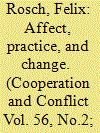

|
|
|
|
|
| Summary/Abstract |
How do practices change? To approach this in practice theory (PT) is a widely debated question. This article brings PT in conversation with the study of emotions in International Relations by considering the role of affect in practice changes. For it is affect that permeates the placiotemporal and bodily constellations during practice performances, continuously provoking changes in and through practices. In initiating this conversation, this article adds to current PT literature by arguing that world political transformations not only find their origin in external conditions, identified as such through individual reflection, but also in affective dynamics of the everyday. To elaborate this more theoretical argument, this article evolves against the empirical backdrop of dancing as an everyday international practice at the Congress of Vienna (1814–1815). Affect that permeated dances in Vienna not only substantiated changes in this practice but, with the waltz replacing the minuet as the preferred dance among international political decision-makers, also changes through it occurred. While the minuet embodied collective sentiments of a transboundary European elite, the waltz helped to further national imaginations of world politics.
|
|
|
|
|
|
|
|
|
|
|
|
|
|
|
|
| 2 |
ID:
178690
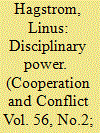

|
|
|
|
|
| Summary/Abstract |
This article draws on identity construction, emotions and a notion of productive power to address the question of why Swedish policymakers and public opinion are becoming increasingly supportive of NATO membership. It contributes theoretically by arguing that such textual phenomena intertwine with ‘disciplinary power’, which operates on the bodies of the subjects of power, exposing them to verbal and physical sanctions, a host of complex feelings and enhanced levels of self-disciplining. The article analyses 354 editorials and op-eds related to Sweden and NATO, published in the four biggest Swedish newspapers in 2014–2018; 1408 tweets, with a focus on 14 selected NATO campaigners and their advocacy; and semi-structured interviews with 12 such influencers. It concludes that Swedish NATO campaigners produce and negotiate emotional discourses in a way that targets other influencers and potential influencers by exposing them to ridicule and allegations of treason. While tendencies are similar on both sides of the debate, the article demonstrates that productive power currently intertwines with disciplinary power in a way that makes anti-NATO advocacy seem more fraught with personal risk than pro-NATO campaigning, and joining NATO appear to be the most normal, realistic and responsible policy option.
|
|
|
|
|
|
|
|
|
|
|
|
|
|
|
|
| 3 |
ID:
178692
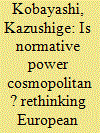

|
|
|
|
|
| Summary/Abstract |
Despite the apparent consensus that European Union (EU) normative power embodies a Kantian cosmopolitan approach to world politics, such a consensus is typically presupposed by scholars, rather than being critically examined by them. By offering macro-historical reflections, this article argues that EU normative power deviates from the Kantian cosmopolitan ideal and in fact replicates the Hobbesian logic of normative homogenization. Renouncing the medieval Vatican’s ambition to construct a united Europe anchored in uniform normativity, Kantian theory celebrates multiple normalcy as the basis for human freedom, perpetual peace, and mutual transformation. In contrast, Hobbesian theory is driven by the conviction that a peaceful value-based community could be built only through normative homogenization, behavioural conformism, and moral unity. In Hobbesian theory, the Leviathan exercises a transformative power to socialize others, eliminate discords, and build a commonwealth through norm diffusion and public education. In this vein, the EU’s aspiration to build a normatively homogenous Europe seems to reflect Hobbes’s vision of normative unity, rather than Kant’s vision of cosmopolitan diversity. Should the EU aspire to pursue a cosmopolitan foreign policy, it needs to pay more attention to the power-political implications of its drive toward normative homogenization and shift its focus from socialization to mutual transformation.
|
|
|
|
|
|
|
|
|
|
|
|
|
|
|
|
| 4 |
ID:
178693


|
|
|
|
|
| Summary/Abstract |
How successful have emerging powers been at increasing their representation within the secretariats of international organizations (IOs)? We examine the representation of the BRIC countries (Brazil, Russia, India, and China) in the International Monetary Fund (IMF), the World Trade Organization (WTO) and the United Nations (UN) System, including the UN Secretariat, over the last two decades. The analysis reveals four major findings. First, some redistribution of staff positions from established to emerging powers has taken place, but it has been relatively minor. Second, nationals from emerging powers are still strongly under-represented in international secretariats in comparison with those from established powers. Third, emerging powers’ representation at the IMF and WTO increased more than in the UN, where it actually declined. Fourth, there is strong variation between emerging powers: India appears to be the most successful emerging power in sending its nationals to the secretariats of IOs, Brazil’s and China’s records are mixed, and Russia has fared poorly. We interpret our findings in light of international relations theories and theories of institutional path dependence. The results suggest that staffing patterns are only loosely related to shifts in economic size and are subject to strong independent institutional dynamics.
|
|
|
|
|
|
|
|
|
|
|
|
|
|
|
|
| 5 |
ID:
178691
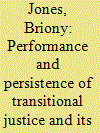

|
|
|
|
|
| Summary/Abstract |
Transitional justice, like other peacebuilding endeavours, strives to create change in the world and to produce knowledge that is useful. However, the politics of how this knowledge is produced, shared and rendered legitimate depends upon the relationships between different epistemic communities, the way in which transitional justice has developed as a field and the myriad contexts in which it is embedded at local, national and international levels. In particular, forms of ‘expert’ knowledge tend to be legal, foreign and based on models to be replicated elsewhere. Work on epistemic communities of peacebuilding can be usefully brought to bear on transitional justice, speaking to current debates in the literature on positionality, justice from below, marginalisation and knowledge imperialism. This article offers two contributions to the field of transitional justice: (1) an analysis of the way the field has developed as an epistemic community(ies) and the relevance of this for a politics of knowledge; and (2) an argument for the politics of knowledge to be more widely discussed and understood as a factor in shaping transitional justice policy and practice, and as a call to a more ethical relationship with the supposed beneficiaries of transitional justice interventions.
|
|
|
|
|
|
|
|
|
|
|
|
|
|
|
|
| 6 |
ID:
178694
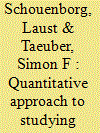

|
|
|
|
|
| Summary/Abstract |
In this article, we aim to contribute to two contemporary debates within the English School. The debate about how to observe primary institutions and the debate concerning hierarchy between primary institutions. Specifically, we analyse references to primary institutions in United Nations General Assembly disarmament resolutions in the decade 1989–1998 and their distribution using descriptive statistics. In this way, the article offers a novel approach to identifying primary institutions empirically, and provides some insight into the hierarchy-question in the sense of documenting the relative numerical presence of references to different primary institutions in a specific issue area and temporal context. With respect to the latter, the key finding is that great power management, diplomacy and international law are by far the most prominent primary institutions in the analysed material. This is an intriguing finding, not least given the importance attached to them by Hedley Bull in his classic work The Anarchical Society: A Study of Order in World Politics. The main contribution of the article is thus to spell out a new approach to how the aforementioned debates might proceed empirically.
|
|
|
|
|
|
|
|
|
|
|
|
|
|
|
|
|
|
|
|
|